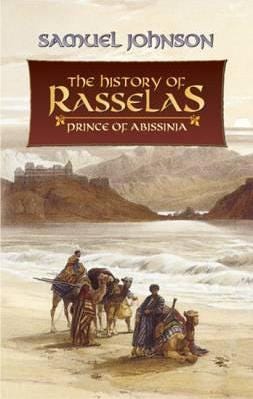What I'm Reading (No. 73): Samuel Johnson + a list of short reads
(I meant to write less about Samuel Johnson and dig into a couple other things, but I just couldn't. I'd say "Sorry" but I'd be lying.)
I'm irrevocably drawn to big books. Massive biographies and huge fiction series line my shelves. Those who know me are well aware of my penchant for carrying around weighty volumes wherever I go. Something about their sheer volume beckons to the part of me that craves an intellectual challenge.
And yet this week I was reminded that sometimes the most potent messages come in the smallest packages.
Jim Mustich has gotten me into a little bit of a Samuel Johnson obsession. I recently finished his only novel: The History of Rasselas, published in 1759. Its 99 pages are broken up into 49 surprisingly readable and impactful chapters.
At this point you're probably asking who Samuel Johnson is. It's a fair question, and yet one that would have seemed absurd a few generations ago. In the 1700s, Johnson became one of the most well-known writers, translators, and literary critics in the world; his name was on par with Shakespeare, and later, Adam Smith, Dickens, Noah Webster, etc. He was known as a "moralist" — someone who penned short essays that would inspire and encourage and move people to live better.
His greatest accomplishment, though, is likely the comprehensive dictionary he put together over the course of a decade in the mid-1700s. Prior to this monumental achievement, there was no real dictionary of the English language. In writing the definition of over 40,000 words, and using over 114,000 quotations to illustrate those definitions, Samuel Johnson singlehandedly put together one of the greatest works of scholarship in all of history. (Oh, and he had a somewhat debilitating case of both Tourette's and OCD.)
Okay, now you know just a smidgen about the guy. My goodness, people, if only you knew how much more I'd love to tell you about him . . .
The only other thing I'll say, for now, is that I'm in the midst of W. Jackson Bate's award-winning biography of Samuel Johnson, and it's one of the more remarkable books I've read. Between the magnetic writing and its immensely inspiring subject, I'm having a hard time putting it down. You'll be seeing that review next week.
For this week, let's look just a little bit at Johnson's lone work of fiction. Before that, though, a list:
A Short-But-Potent Reading List
All of these come in at under 120 pages or so, and have been deeply impactful in my life. Give 'em a shot.
Meditations by Marcus Aurelius. The centerpiece of Stoic philosophy. Some of the most quotable pages you'll ever come across.
The Life of Frederick Douglass by Frederick Douglass. A classic American story of escape from slavery and also of self-education. Inspiring as anything you'll ever read.
The Autobiography of Benjamin Franklin. Another classic American autobiography. A manifesto of self-improvement, which includes a famous 13-week "plan" as well as ideas for morning and evening reflections.
The Strenuous Life by Theodore Roosevelt. Mentioned in last week's list too. A series of essays which extol TR's view of life — particularly that living strenuously and virtuously is the ideal.
A Christmas Carol by Charles Dickens. An all-time favorite of mine. Not only whimsical and plain delightful to read, but also chock-full of lessons on joy.
The History of Rasselas by Samuel Johnson. See below.
The History of Rasselas: Prince of Abissinia

I'll start by noting that Abissinia is an old name for Ethiopia. So this book falls into the somewhat popular "Oriental tale" genre of the time: an exotic locale, a marvelous adventure, and some life lessons learned. The Wizard of Oz, for instance, is a play on this theme.
Anyways, our protagonist, Rasselas, is a prince in a place called, simply enough, Happy Valley. It's a place that "supplied its inhabitants with the necessaries of life" and where "every desire was immediately granted." Rasselas' life was, in the immortal words of the Fresh Prince, all about "chilling out, maxing, relaxing all cool."
In some ways, our prince reminded me Holden Caulfield, The Catcher in the Rye's resident Millennial. Rasselas is young guy who's just a little bit bored of life and wants to see more. He's a bit ignorant of how the real world operates. So, all his luxury isn't fulfilling him in the least and he wants to choose a life of his own — one that brings true satisfaction.
So he sets out to escape his valley with a few tagalongs, including an older guide of sorts named Imlac. They travel, ask all kinds of people what the path to happiness is, and have a lot of conversation discussing those paths.
It's very much a philosophical, moralistic, and conversation-laden novel. Peppered throughout are Imlac's (really Johnson's) musings on what brings happiness in life. And it's just marvelous. As I noted above, nearly every page was marred by my fancy Blackwing pencil. The book has spurred questions that I seem to be constantly asking myself since finishing it.
One of just many things I wrote down into my journal: "It seems to me," warned Imlac to Rasselas, "that while you are making the choice of life, you neglect to live."
I hadn't heard of this slim novel before digging into Johnson's life. But I'm so excited that I found it. And I can't wait to read it again. (Of course its brevity helps!) I promise that you'll like Rasselas way better than Holden.
That's all for me this week. I'd love to hear what you're reading, and thank you for your time and inbox space.
-Jeremy
